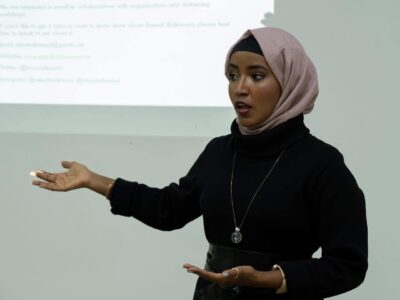
Students studying at a library in Wuyuan, China. Photo by Jason Hu on Pexels. Free to use.
By Salima Ennasabi
A growing number of African students are moving to China for higher education as economic and social pressures push many young people to seek opportunities abroad.
Between 2011 and 2018, the number of African students studying in Chinese higher education institutions increased from 20,744 to 81,562, making China the second most popular destination for African students, after France.
Morocco has emerged as one of the leading countries for students studying abroad, ranking 18th globally in 2022 with 74,289 students pursuing their education internationally.
Why are students leaving?
For Moroccan Gen Z, who struggle to keep up with living costs and who must rely on their families to stay afloat, studying abroad offers pathways to better education and job prospects that promise greater social protection and financial stability.
In some European countries, as well as in China, graduates can secure jobs that allow them to live independently and plan for the future. This stability is often hard to find back home, where the unemployment rate among young people aged 15 to 24 reached an unprecedented 39.5 percent in the first half of 2025, according to a labor market report from the High Commission for Planning (HCP).
Meanwhile, if they do find a job, the first average net salary for university graduates does not exceed MAD 4,959 (USD 550) monthly, which in cities like Casablanca or Rabat, where rent is exceptionally high, barely covers basic living costs.
This reality leaves many feeling trapped in a system that fails to reward their efforts.
“There are no opportunities, and no choices,” 20-year-old Ihsan explained in a conversation with the Friedrich Neumann Foundation. “Some really talented people, smart geniuses, I would describe them, are working jobs that do not pay well. And it’s very unfortunate, because I would see myself being one of them in the future after getting my degree,” the English literature student added.
Gen-Z protests
Frustration with these conditions led hundreds of young Moroccans to organize a series of protests that began on September 27. The protests, which faced backlash from authorities, demanded reforms in employment, healthcare, and education — critical sectors for the nation’s human capital development — as the education system continues to fail many students.
Despite government efforts, including a budget increase to around 16.9 percent in 2021 (well above the Organisation for Economic Co-operation and Development, OECD, average of 12.4 percent), systemic problems persist in higher education. Universities remain overcrowded, forcing some students to sit on floors. Resources are limited in science labs, leaving experiments to the students’ imagination. Access to quality programs differs significantly by region, making many move hundreds of kilometers away from their hometown to a new city where dormitories are full and scholarships are unavailable.
It is no surprise that many young people are developing a mobility mindset, which creates a cycle of social peer pressure to leave the country, as Hakim describes from his own experience living near coastal cities closest to Spain. From the moment they are born, even children from well-off families hear that Europe is “heaven,” and they want to leave Morocco, influenced by cousins abroad or by what they see on television.
In response to this, educational agencies and content creators have capitalized on the rising demand for study-abroad options, transforming the educational consulting market in the process.
Content creators filling the information gap
Electronic word-of-mouth also plays a significant role in the increasing number of students moving to China. In Morocco, where about 97 percent of young people are active on social media, digital content created by local educational agencies and student-led promotions of Chinese universities tends to resonate more with prospective international students. This content uses simple, accessible language and offers a glimpse into the lives of content creators who are already studying in China and often come from similar social and financial backgrounds as their audience.
Showing relatable experiences creates a bond between the audience and the agency or influencer, often in ways that feel more relatable and trustworthy than traditional campaigns.
One of these well-known influencers who shares China-related content is Alae Kandil. Through her channel on YouTube, which has 200,000 subscribers, she documents her life as an international student in Hangzhou, China.
In a two-part video series, Alae and Abderrahman Zahid, the founder of an intermediary agency called Tawjeeh, openly discuss their experiences as international students. They address important topics like safety, misconceptions about China in Western media, the quality of Chinese universities, and how to make the most of student life.
Content creators like Alae often exhibit a recurring pattern in their work. Their content is typically positive and constructive, emphasizing the lifestyle and benefits of studying in China rather than delving into the specifics of applications or paperwork.. This approach helps attract an audience while leaving space for paid services or educational agencies to provide more detailed support.
Content creators typically fall into two categories: those who stay in the influencer lane, focusing on monetizing their content and collaborating with educational agencies, and those who turn their work into a business by launching a formal agency.
Educational agencies as middlemen
Agencies operating in Morocco are often run by former students who use their firsthand experience of China to establish agencies across several cities, including Casablanca, Rabat, and Marrakesh.
Generally, there are two types of educational agencies. One is institution-focused, meaning they are contracted by universities to recruit students, and they receive a commission for every successful enrollment. The second type is student-focused; rather than being paid only by the universities, they charge students directly for helping them secure admission. They operate both online and offline through marketing campaigns on social media platforms, collaborations with influencers, and by organizing educational fairs.
Official agency websites indicate that when recruiting students, agencies focus on three factors: affordability, quality of education and job prospects. The last is less developed than in traditional destinations such as Canada and the UK, where pathways to residence or citizenship are often clear, even if increasingly difficult.
In China, international students face a complicated process when converting a student visa (X-visa) into a work visa (Z-visa), which requires a job offer, employer sponsorship, and, in many cases, a minimum of two years’ work experience abroad, effectively forcing many graduates to return to their home countries. These restrictions, together with linguistic and cultural barriers, further reduce employment opportunities for international graduates.
Nevertheless, there remains a strong interest in studying in China, and educational agencies have found a ready market among Moroccan students, many of whom are unfamiliar with international application procedures, have limited access to funding information, and need guidance in navigating admissions and visa processes.
Some students report positive outcomes, while others encounter unethical practices that prioritize the agency’s interests over the students’ benefit. Walid Elamri, a content creator studying in China, made a video detailing how he was scammed by a well-known local agency that had promised him university acceptance for a one-year language program in China, along with visa support, only to find out the course was online, and he could not go to China. He had also compiled similar testimonials on his Instagram account to raise awareness about the fraudulent practices of some educational agencies in Morocco.
It remains uncertain how the growing influence of student content creators and educational agencies will shape the movement of Moroccan students to China and their experiences during this process. Given how little research exists on this topic, the long-term impact of these actors is unclear. Beyond this is a larger question: what will be the long-term impact on Morocco if its most educated and talented youth continue to leave?







